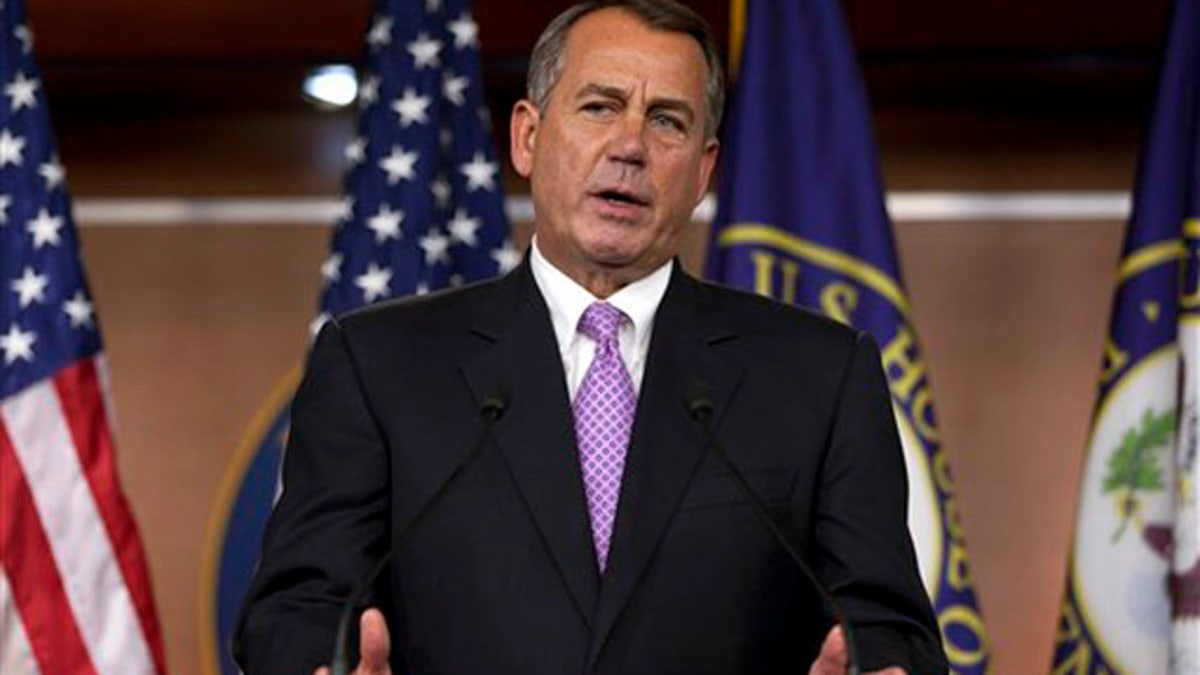
Dec. 22, 2011: Speaker of the House John Boehner of Ohio speaks at a news conference on Capitol Hill. (AP)
WASHINGTON – The House of Representatives voted Wednesday to reject a request by President Obama to raise the debt ceiling -- a largely symbolic vote, since the Senate is expected to allow the debt ceiling hike.
The House voted, 239-176, in support of a measure that voices opposition to the increase. Six Democrats voted along with Republicans to oppose the debt ceiling increase. House Republicans had only one defection -- California Rep. David Dreier.
The proposal came before the House as part of the bipartisan debt deal struck in August. Under the deal, Obama was required the submit a request to Congress to raise the debt ceiling in three stages. The latest request, which was the final stage, would raise the debt ceiling by another $1.2 trillion.
Despite Wednesday's vote, Obama would still have the authority to raise the debt limit unless the Senate follows suit. Even then, both chambers would likely need to muster a two-thirds majority in order to override a presidential veto. The Senate is expected to vote next week on the resolution, a senior Senate Democratic leadership aide told Fox News.
Under last year's debt increase law, supported by all of the top GOP leaders on Capitol Hill, the debt limit is automatically raised 15 days after the president officially notifies lawmakers that the government is close to the current $15.2 trillion cap -- unless Congress votes to deny the borrowing increase.
The political dance choreographed under last summer's Budget Control Act was designed to permit lawmakers, mostly Republicans, to vote against the debt increase but not actually block it, which would provoke a first-ever, market-rattling default on U.S. government obligations.
The debate offered Tea Party-backed GOP freshmen an opportunity to cast blame on the White House and Democratic-controlled Senate for the nation's fiscal ills. The national debt has skyrocketed during Obama's first term -- from $10.6 trillion on Inauguration Day to $15.2 trillion today. Much of the blame lies with the deep recession Obama inherited, which made revenues plummet, but almost $1 trillion of the increase can be attributed to Obama's 2009 deficit-financed economic stimulus bill.
"Instead of giving the president more power to spend money we do not have, Congress should work together to find ways to cut spending and put America back on a path to fiscal responsibility," said Rep. Joe Wilson, R-S.C.
Democrat Jared Polis of Colorado said that even under last year's nonbinding House GOP budget plan, the national debt would have risen by more than $5 trillion over the coming decade anyway. And he pointed out that the new borrowing authority is needed to pay for a $1 trillion-plus omnibus spending bill that many Republicans supported just last month.
"We're here playing a counter-productive and absurd game," Polis said.
Even one GOP veteran said Wednesday's debate was a futile exercise, given how the August debt pact intentionally stacked the cards in Obama's favor.
"We have in effect given the president of the United States the ability to raise the debt ceiling without us not having any control whatsoever," said veteran Rep. Dan Burton, R-Ind. "We gave the president carte blanche and it's dead wrong."
The House passed a similar resolution in September after Obama used his authority to raise the debt cap by $500 billion.
Last year's debt agreement permits a total debt limit increase of $2.1 trillion in exchange for an equivalent amount in spending cuts, which would be spread out over the coming decade. The first $900 billion comes from caps on the day-to-day operations of federal agencies.
Fox News' Chad Pergram and The Associated Press contributed to this report.




